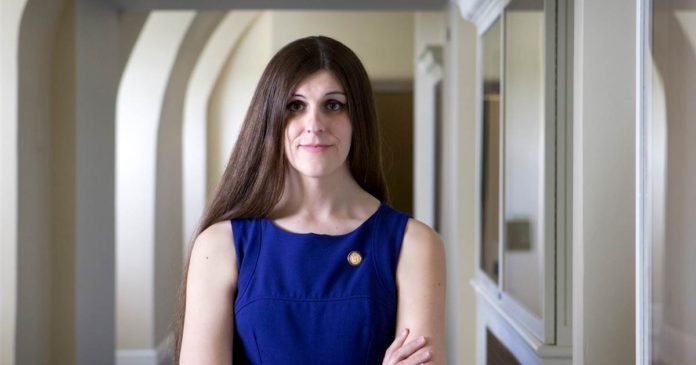
Virginia has become the 12th state to ban the use of the “gay/trans panic” defense.
Gov. Ralph Northam signed a bill Wednesday against the defense, which has allowed those accused of homicide to receive lesser sentences by saying they panicked after finding out the victim’s sexual orientation or gender identity.
The bill passed the state House and the Senate in February.
The bill’s author, Democratic Delegate Danica Roem said she first became aware of the defense after Matthew Shepard, a gay man, was murdered in 1998, and the men who killed him used the defense in court, according to the American Bar Association. Then, in 2004, one of the four men who were convicted of killing Gwen Araujo, a trans teenager, also used it.
Roem was a college freshman and knew she was trans when she read about Araujo’s death. It terrified her, she said.
But what made her determined to introduce a bill to ban the defense in Virginia was a letter she has received from a 15-year-old LGBTQ constituent.
“He’s out, and he sent me an email asking me to pass this bill, and I came to realize that in 2021, my out teenage constituents are living with the same fear that I did in 1998, after Matthew was killed, and that I did in 2002 after Gwen Araujo was killed,” Roem said. “And you think of how many other people will stay closeted because they have a fear of being attacked, let alone all the other fears that a closeted person who wants to come out has.”
Roem said that a researcher who studies the LGBTQ panic defense testified that it has been used at least eight times in Virginia. She said some Virginia lawmakers questioned it, arguing that other legal defenses aren’t banned, which Roem said is not true.
“We went through the list,” she said. “The rape shield law — you cannot blame a rape survivor or a rape victim’s past sex life, more or less, for that person’s rape in that encounter. Their sexual history is irrelevant.”
In addition, committing statutory rape against someone 14 or older and then marrying that person does not exonerate the rapist, she said. The marriage “is not a viable defense in court,” Roem said.
“What we were showing was, sometimes things are so egregious that when we have this universal acknowledgement that this shouldn’t be happening, we codify that,” she said. “And so that’s what we did with this bill.”
Though only 12 states have banned the defense, Roem said it’s still progress. And, she said, it’s a sign that the makeup of state legislatures is changing.
In Vermont, Taylor Small, who was elected to the state House in 2020 and is the state’s first openly trans legislator, introduced a similar bill there.
“You’ll notice with me introducing this bill, with Taylor Small introducing this bill in Vermont, that, as more of us who are coming from the very communities that are most affected by legislation like this have that lived experience that we were bringing to the table, we are able to speak to this,” Roem said.
Having more openly LGBTQ representatives, particularly trans people, affects whether constituents feel like their concerns will be heard, she said. “In my case, my teenage constituent — who knows that his delegate is trans, and he as someone who’s out feels safe talking to her — can send me a bill idea and say, ‘Delegate Roem, can you carry this, can you make this happen?’ And my answer to that constituent, my answer is ‘yes.’ And we did.”
Roem said that Virginia, as the first Southern state to pass a ban on the defense, also sets an example for other states. She said Virginia banned the defense before Vermont, Maryland and Massachusetts, though both Vermont and Maryland are considering similar bills. Roem said that once Delaware “gets on board,” she hopes the Mid-Atlantic states can send a message to LGBTQ people.
“I hope that as a region, the Mid-Atlantic can really tell people that you are welcome here because of who you are, and we will protect you here because of who you are,” Roem said. The delegate also said that if an LGBTQ person is killed or hurt, the state will not “let them use your mere existence as an out LGBTQ person — or the perception of you being LGBTQ — be a reason that they can hurt you.”








